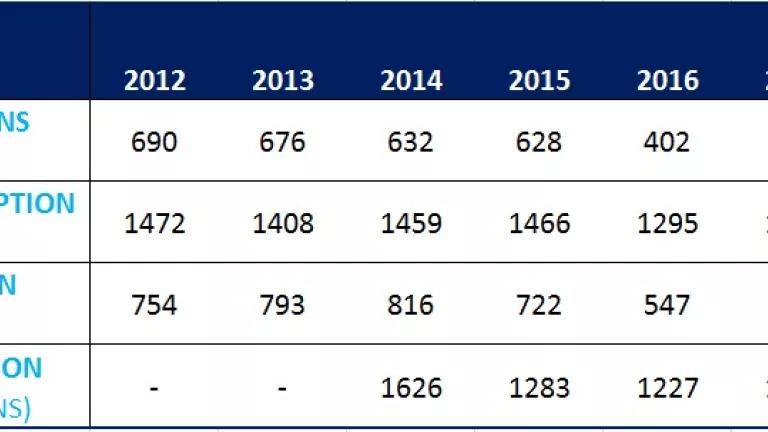Key Takeaways from the Latest RGGI Investment Report
A new report out today confirms the Regional Greenhouse Gas Initiative is a tremendous success story whose benefits continue to grow.

Photo: Jose Gabriel Ortega Castro via Unsplash
The Regional Greenhouse Gas Initiative is an innovative climate program that for the last 10 years has helped cut harmful power plant carbon pollution in half across nine Northeast and Mid-Atlantic states. At the same time, RGGI, as the program is usually called, has lowered energy bills, grown the region’s economy, created jobs, and improved public health by cleaning up our air. A new report out today confirms that RGGI is a tremendous success story whose benefits continue to grow, and it shows how, in the absence of national leadership, states are forging ahead to protect our health, environment, and economy from the worst impacts of climate change.
With the figures from today’s report included, RGGI’s investments in energy efficiency, renewables, and other programs to date have now saved residents of Connecticut, Delaware, Maine, Maryland, Massachusetts, New Hampshire, New York, Rhode Island, and Vermont at least $1 billion on their energy bills, with $10 billion in bill savings expected overall.
The report makes a strong case for states like Pennsylvania and Virginia to join RGGI and share in the program’s benefits. It also bolsters efforts underway for Northeast and Mid-Atlantic states to develop a similar policy framework under the Transportation and Climate Initiative that would reduce carbon pollution from transportation—the largest contributor to climate change—and take another big step toward averting a climate catastrophe.
How RGGI Benefits the Region
RGGI works by setting an overall limit, or cap, on carbon pollution from power plants that declines over time. The cap forces polluting power plants to reduce their emissions and incentivizes cleaner alternatives, such as renewable wind and solar power and investments in energy efficiency.
To enforce the cap, the RGGI states require owners of polluting power plants to pay for their pollution by requiring them to hold permits, known as allowances, for each ton of carbon pollution they emit. These allowances are sold at auction, with the total number sold limited to the level of the cap. The states invest the proceeds they raise in programs that further reduce pollution and benefit residents.
Numerous studies have documented RGGI’s benefits to the region. For example, independent economic experts at the Analysis Group have shown that, since 2009, RGGI has created 45,000 job-years of work (a job-year equals one year’s worth of full-time employment for one person) and added $4.3 billion in economic value in the region. Another analysis found that, by cleaning up the air, RGGI has helped prevent asthma attacks, respiratory diseases, and other health conditions, with health benefits valued at $5.7 billion.
Today’s report adds to these figures by looking at the benefits from the RGGI states’ investments of allowance proceeds in 2017. Thanks to investments in energy efficiency, renewable energy, and other programs, RGGI helped save households and businesses $128 million on their energy bills in 2017. Moreover, these measures will continue to provide benefits in future years and are expected to save $1.4 billion overall. All told, looking at RGGI’s investments from previous years as well, the program has saved residents at least $1 billion on their energy bills, with $10 billion expected over the lifetime of RGGI-funded measures.
Given these impressive results, it’s no surprise that the RGGI states have outperformed states outside the program both environmentally and economically. In a recent report, our friends at the Acadia Center found that over the last decade power plant carbon pollution in the RGGI region has fallen nearly twice as fast compared to other states. At the same time, the RGGI states’ economies have grown 31 percent faster than non-RGGI states and electricity prices in the RGGI region have fallen by an average of 5.7 percent, even as prices have risen by 8.6 percent in other states.
Takeaways for New and Prospective RGGI States
RGGI’s long-term success is a clear signal to other states that tackling the climate crisis is good for both people and the planet.
RGGI’s proven benefits are the reason that New Jersey will join the program in the coming weeks, on January 1, 2020. Virginia has similarly adopted power plant rules to bring the state into the RGGI market by 2021.
Last week, Pennsylvania Governor Wolf boldly committed his state to join RGGI. And North Carolina’s recent Clean Energy Plan, which sets ambitious emissions reduction targets for the power sector, signals that state is interested in exploring a RGGI-like approach to tackling emissions.
With these state commitments and the program’s continued success, RGGI has the wind at its back and we all stand to benefit.
Takeaways for the Transportation and Climate Initiative
Today’s report also provides good news for Northeast and Mid-Atlantic states exploring a similar policy approach to tackling carbon pollution from transportation under the Transportation and Climate Initiative, or TCI.
Transportation is the biggest source of carbon pollution in the Northeast and Mid-Atlantic and nationwide, emitting even more climate-changing pollution than power plants.
Last week, the TCI states released a policy framework for a regional clean transportation policy that would cap and reduce pollution from transportation fuels; enforce the cap through allowances sold at auction; and invest allowance proceeds in clean transportation options, such as public transit, safe walkable and bikeable streets, and clean electric vehicles.
Because most of the TCI states are also participants in RGGI, they’ve already seen how smart climate policy can create numerous additional benefits for residents, including improved public health, job creation, and economic growth.
As the TCI states continue developing a regional clean transportation policy over the coming months, they can learn from and build upon their experience in RGGI, while addressing the unique attributes of transportation to ensure that this policy lifts all communities, particularly those underserved by the current transportation system or disproportionately impacted by climate change and transportation pollution. And perhaps they can develop a model for the entire nation, one that leads to a healthier, more prosperous future for us all.



